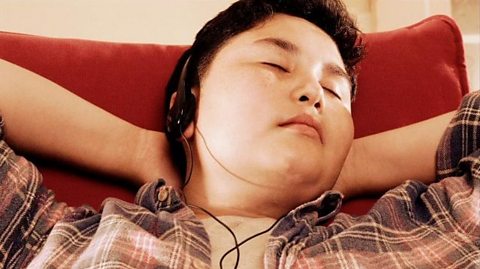Doctor, Doctor! My exams are just around the corner and the pressure is on…
Fear not - 91»»±¨ Radio 1's Dr Radha and former Love Island contestant Dr Alex have prescribed some tips on Life Hacks, all based on your questions. Here are their Revision Remedies to help ease the symptoms of exam stress!

Q: Is it better to revise in large chunks or smaller chunks?
"I think it’s really important that you break down things into smaller chunks," says Dr Alex. "Personally, I remember when I was revising for my A-Levels I couldn’t sit down for hours on end trying to learn."
He suggests studying for 20-minute chunks, followed by 10-15 minutes moving around and having a short break. "Giving yourself a break regularly means that you're keeping fresh and you’re much more able to absorb information… just do something different, move and give yourself a little break. It gets boring otherwise!"
Dr Radha agrees: "Split your day into thirds. So one third should be revising, one third should be doing something you enjoy, and the other third should be sleeping." She says we consolidate the learning we've done that day through sleep - so neglecting it is a really bad thing to do!
Q: How do you stop nerves affecting you in a face-to-face exam setting?
Dr Radha suggests doing something physical before you go into the exam room, such as taking a walk, to get rid of anxiety and adrenaline. She also says practising the first couple of seconds of the exam scenario in your head helps you feel prepared for what will happen when you enter the room.
"And breathing," she adds, "keeping your feet on the ground, breathing before going in and just saying a really positive statement about yourself, like: ‘I can do this, I’ve done it before and I’m going to do it now.’"
Dr Alex advises avoiding caffeine before an exam - including the night before, as the effects can last for a long time. While it might feel useful during a written exam, it can make you really shaky during a practical. "You’ve got enough adrenaline running through your system and you don’t need any more," says Dr A.

Q: What tips do you have for sleeping on nerves?
Dr Alex thinks the single most important thing here is practising mindfulness - by this he means putting 15-20 minutes aside before bed to relax and "let your mind settle". He suggests putting on quiet music and focusing on your breathing, noticing the thoughts that come into your head and then letting them go. This will put you in a clear mind set to not only sleep, but then wake up feeling positive.
Dr Radha adds that doing exercise the day before an exam will really get you tired, and recommends having "a nice bath before you go to sleep".

Q: How can parents make life easier and less stressful for kids sitting exams?
"You can help with the practical stuff," says Dr Radha. Making meals, getting you to exams on time and helping revise out loud are all great things that parents can do during revision season. Parents should encourage balance and make sure kids are doing things other than revising.
Don't disregard worries or feelings: "Don't just say: 'Oh you have nothing to worry about, you'll be fine,'… ask specifically what they’re worried about, and try and work through how you can help them with that."
Finally, the thing Dr Radha thinks is most important for parents is to "try not to put any of your expectations onto them. They’ve already got that from teachers, they put that on themselves and their friends - so just let them know that, no matter what happens in their exams, they did their best and you’ll help them if something doesn’t go to plan."

Q: What kind of food should you eat during exam season?
The Love Island doctor says it's particularly important to avoid sugary foods, particularly on the day of the exam. "Chances are if you eat loads of sugary foods you will have that massive boost of energy but then quickly have a crash," he says, "and that can really affect your energy levels two or three hours into the exam."
Instead, remember to eat healthily during exam season so that all the right stuff is going into your body. Dr Radha also comments that you should stay hydrated: "Often we forget to drink water and we’re drinking fizzy drinks with lots of sugar in them - so lots and lots of water will help your brain function very well."
Q: Do you have any tips to stop procrastinating when it comes to assignment work?
Dr Alex advocates putting your phone aside for a while, or making sure your apps are set to an allocated do-not-disturb time, so you won't get distracted by social media or bothered by other people. He recommends you "plan a bit of time as well", for example by mapping out a plan to work for 45 minutes, and knowing exactly what you want to achieve during that time.
"The other big thing I would do is reward yourself," he says. Set a goal to work towards to stay motivated, such as going out to eat or catching up on the latest episode of your favourite show.
"I’d add to that," says Dr Radha, "we kind of put things off because we’re frightened of something… What are you actually worried about, and can you tackle that?" For example, if you have trouble getting started on revision, she suggests getting someone else to put a structure in place for you. And remember: “Often our fears in our brains are actually much bigger than they are in real life."

Q: Is there a good way to remember names of researchers and who carried out which studies?
"I had a bit of a strange technique of making up a little story about the different people and how they all met each other or interacted with each other," says Dr Radha. She says we remember stories much better than isolated facts. You can also ask someone in your family to test you out loud so you can remember the 'characters' of the story. "My sister used to test me… I used to then remember that name because I'd associate it with revising with my sister."
Dr Alex has a tip that he picked up from one of the Chasers from ITV's The Chase - so it must be good! Try and associate what you're learning with a particular environment. For example, Dr A says the Chasers will go away and "learn Maths in a field or something - they said they’d associate that moment with a place and time."
Q: No matter how hard I study for my exams, nothing seems to go in. What should I do?
‚ÄúWe all sometimes hit a block where we can‚Äôt seem to learn anymore,‚Äù says Dr A. ‚ÄúTake a bit of time out from it - give yourself a break.‚Äù He also suggests switching technique. If you‚Äôre learning through reading, have a go at something different, e.g. an online resource. ‚ÄúTry 91»»±¨ Bitesize, for example, and the ,‚Äù he adds. ‚ÄúTry something different and maybe you‚Äôll find it‚Äôll go in.‚Äù
Dr Radha suggests it could be fear getting in the way: “Maybe again it’s related to a particular subject - is there a particular problem you’ve got with that topic? Can anybody help you with that?” She agrees that "changing it up" and having variety in your learning methods helps.
Remember these revision remedies to help you smash those exams. The doctors wish you luck!
Camilla: humanitarian worker video
Camilla explains how working as a mine clearer sharpened her focus in life.

Dr Alex debunks exam stress
Love Island's Dr Alex is here to demystify exam stress and help keep you calm.

Six things we learned from Dr Radha's Exam Survivors podcast
Worried about exams? Dr Radha's podcast can help.
